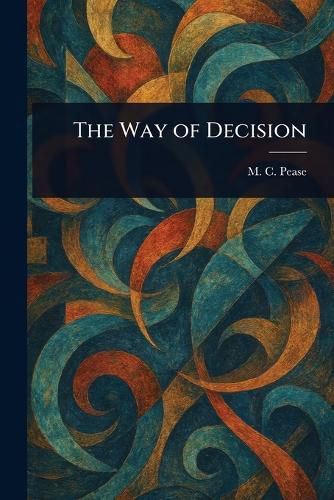Readings Newsletter
Become a Readings Member to make your shopping experience even easier.
Sign in or sign up for free!
You’re not far away from qualifying for FREE standard shipping within Australia
You’ve qualified for FREE standard shipping within Australia
The cart is loading…






This title is printed to order. This book may have been self-published. If so, we cannot guarantee the quality of the content. In the main most books will have gone through the editing process however some may not. We therefore suggest that you be aware of this before ordering this book. If in doubt check either the author or publisher’s details as we are unable to accept any returns unless they are faulty. Please contact us if you have any questions.
Explore a fascinating vision of the future in M. C. Pease's "The Way of Decision," a thought-provoking work of utopian fiction. Delving into themes of social engineering and future society, this novel presents a unique perspective on marriage and its potential evolution. The story explores the concept of group marriage within the framework of a carefully designed social structure.
Considered a historical work of science fiction and romance, "The Way of Decision" provides a glimpse into societal ideals and anxieties surrounding relationships. Readers interested in sociology, particularly the study of marriage and family structures, will find this book a compelling exploration of alternative social models. This meticulously prepared print edition offers a fresh opportunity to engage with a story that continues to spark debate and inspire reflection on the very nature of human connection and societal organization.
This work has been selected by scholars as being culturally important, and is part of the knowledge base of civilization as we know it.
This work is in the public domain in the United States of America, and possibly other nations. Within the United States, you may freely copy and distribute this work, as no entity (individual or corporate) has a copyright on the body of the work.
Scholars believe, and we concur, that this work is important enough to be preserved, reproduced, and made generally available to the public. We appreciate your support of the preservation process, and thank you for being an important part of keeping this knowledge alive and relevant.
$9.00 standard shipping within Australia
FREE standard shipping within Australia for orders over $100.00
Express & International shipping calculated at checkout
This title is printed to order. This book may have been self-published. If so, we cannot guarantee the quality of the content. In the main most books will have gone through the editing process however some may not. We therefore suggest that you be aware of this before ordering this book. If in doubt check either the author or publisher’s details as we are unable to accept any returns unless they are faulty. Please contact us if you have any questions.
Explore a fascinating vision of the future in M. C. Pease's "The Way of Decision," a thought-provoking work of utopian fiction. Delving into themes of social engineering and future society, this novel presents a unique perspective on marriage and its potential evolution. The story explores the concept of group marriage within the framework of a carefully designed social structure.
Considered a historical work of science fiction and romance, "The Way of Decision" provides a glimpse into societal ideals and anxieties surrounding relationships. Readers interested in sociology, particularly the study of marriage and family structures, will find this book a compelling exploration of alternative social models. This meticulously prepared print edition offers a fresh opportunity to engage with a story that continues to spark debate and inspire reflection on the very nature of human connection and societal organization.
This work has been selected by scholars as being culturally important, and is part of the knowledge base of civilization as we know it.
This work is in the public domain in the United States of America, and possibly other nations. Within the United States, you may freely copy and distribute this work, as no entity (individual or corporate) has a copyright on the body of the work.
Scholars believe, and we concur, that this work is important enough to be preserved, reproduced, and made generally available to the public. We appreciate your support of the preservation process, and thank you for being an important part of keeping this knowledge alive and relevant.